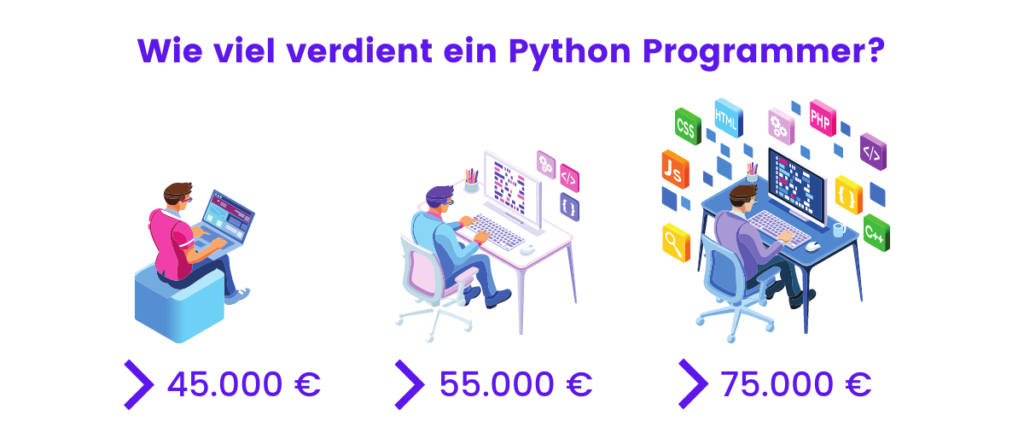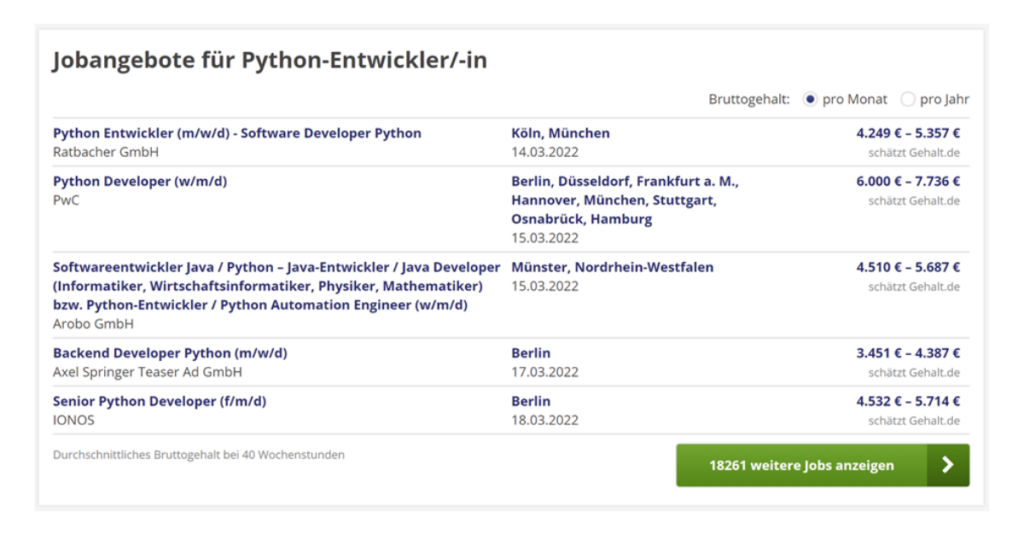Reading time: 5 min
In the world of programming languages, Python is king. The demand for Python programmers has been increasing for years, in contrast to the supply of young talent, which is few and far between. This means that the earning potential for Python programmers is very bright.
If you are reading these lines, you may be thinking whether the job as a Python programmer would be right for you, what tasks and salary await you in this job, and what is the best and fastest way to learn Python programming.
How do I get a job as a Python Programmer? This article will answer all the relevant questions about becoming a Python Programmer and help you get started with Python.
Before we show you how you can become a Python programmer, a few words on why it's definitely worth your while to learn Python. And best of all: thanks to the Education voucher you can even get further training free of charge under certain conditions.

Why you should learn Python
Whether you are a beginner or already know something about programming, you certainly know the so-called building blocks of web development: HTML, CSS and JavaScript. Unlike these markup and programming languages, Python is a true all-rounder.
After all, Python is not only interesting for web development, but also for software development, writing system scripts, automations, machine learning - and perhaps most importantly - data science.
Python can be used for data collection and data analysis to find helpful answers to questions and deliver insights to business areas where they are needed most, such as product development or strategic management.
In 1991, this general-purpose programming language was born when Guido van Rossum developed it to help developers write clear, logical code in a simple syntax. Nearly 30 years later, Python is one of the most popular most popular programming languages in the world among companies, developers and beginners. Why there is a lot of humor in Python, you will learn in this article.
The Python programming language has a clear advantage in the popularity race: It is suitable both as an entry-level programming language for novice programmers and as a valuable additional skill for experienced developers. And in the fast-moving world of programming languages, it is particularly promising for the future, because it is the preferred programming language for data science, machine learning and artificial intelligence.
You want to start learning Python right away? Let's take a closer look at the Python Programmer job.
Tasks: What does a Python Programmer do?
In your job as a Python Programmer you will design, program and debug various applications and projects. Because of its versatility, you can take on very different tasks as a programmer with Python skills, among others
- Writing and implementing applications
- Data acquisition and analysis
- Creation of database schemas
- Display and support business processes
- Automations
- Web development and design
- Scripting and much more.
Therefore, Python programmers may also take on other job titles, including web developer, software engineer, or data analyst. For each of these jobs, the exact duties and requirements of the employer depend, but all have similar benefits:
- Your work is suitable for the office, home office and remote work, all you need is a laptop and an internet connection.
- You can get hired directly by a company or work as a freelancer.
- Programmers:inside have, according to a Indeed investigation a high level of job satisfaction.
- Salaries for Python programmers are above average.
- You have a high job security, because programmers are wanted and needed in all industries. And the trend is rising.
Am I qualified to be a Python programmer?
To make your career as a Python programmer a success, you need more than just technical knowledge. Soft skills are also necessary, such as:
- Analytical, solution-oriented thinking
- Good communication skills
- Willingness to continuously develop and learn new tools and Python libraries
- A substantial industry knowledge for the field in which you work (automotive, pharma, etc.)
- A strong technical understanding (you can learn anything)
- Not shying away from challenges
- Curiosity and openness
If you have these skills, you are perfect to be a Python programmer. If not, don't worry. You really can learn anything if you want to, and often it's only when you've started something that you realize it's easier and more fun than you first thought.
But prioritizing and investing in the right skills are very important, so let's take a look at your earning potential as a Python Developer.
What is the salary of a Python programmer?
Salary is an important factor, especially for job changers and career changers. After all, you want to know if it's worth rolling up your sleeves and learning a completely new skill.

According to Glassdoor the average salary of a Python developer is 55,956 euros per year or 4,663 euros per month. Top developers even earn up to 73,037 euros.
How much you earn as a Python Programmer depends on the state, the industry, your experience and other skills. However, to give you an approximate idea, here is a screenshot from the Python Programmer job listings of Salary.com.

How to get a job as a Python Programmer
If you've read this far, you already know that the demand for Python programmers is still growing. The MINT Spring Report 2021 of the Institute of the German Economy recorded around 359,000 unfilled positions in 2021 and only 228,500 people available for these jobs. Programmers top this list of the most sought-after professions, and almost every industry is currently experiencing a shortage of IT specialists.
So, as a Python Programmer:in, you have a wide range of employers to choose from, because all major companies need programmers with Python skills. Some of the most well-known among them, whose code is mostly written in Python, include:
- Meta (Facebook)
- YouTube
- Netflix
- Dropbox
So getting a job as a Python Programmer is not difficult with the wide range of jobs and career opportunities available. But how do career changers get a job as a Python programmer?

How do I become a Python programmer (with no prior experience)?
Good news: Python is very easy to learn! There are numerous Python bootcamps, online learning platforms, tutorials and providers for a reason. Which way is right for you depends mainly on the following questions:
- Do you already have previous experience?
- Are you well organized and can easily motivate yourself to study every day?
- Do you find it easy to understand and implement technical concepts without outside help?
If your answers to all these questions are yes, then you can try your hand at Python online tutorials and free Python bootcamps, which already require some prior knowledge and quick grasp.
If you couldn't answer each of these questions with a resounding yes, it pays to invest in a good basic education, as with any craft. Why? Even though it's appealing to learn Python for free, especially in the beginning, mistakes will quickly creep into your code that will be difficult to correct or unlearn later.
You might be asking yourself, which Python bootcamp is the right one for me? Free Python bootcamps do not always offer the quality and depth of information that is especially important for beginners. Therefore, your focus should be on a solid basic education, which you can then build on autodidactically if necessary.
With a good knowledge base, you can then already gain a foothold as a freelance Python developer and open your first doors. Here, a well-supported mentoring in the Python Bootcamp in German can also help you to establish important contacts that will later lead to your entry-level programming job via recommendations.
Another tip for career changers is the following: Build up a portfolio with different works and projects parallel to the Python Bootcamp, which you can show later at job interviews. This underlines your credibility as a professional programmer. After your basic training, it is worthwhile to stick with it and focus on Python practical projects that deepen your knowledge.
Your Python Bootcamp 2023
If you are still looking for a Python online course with certificate, then we have just the thing for you: In StackFuels German Python bootcamp with certificate you learn the basics and more advanced skills. You gain experience in:
- Processing data and texts in Python
- Work with the most important Python libraries (Dict Comprehension Python)
- Carrying out a practical project on Automation of work processes
- Object-oriented programming (OOP) with focus on classes and attributes
- Use inheritance for code reusability
- Advanced functions for simplifying classes
- Final project to configure a password manager
Especially for career changers, the Certificate of completionthat you receive upon successful completion of the Python Bootcamp is so valuable because it certifies and thus validates your new Python skill.
We put the focus on Realistic practical projects and a good Mentoring by experienced programmers and data scientists. In the Live webinars you can ask your questions and benefit from the StackFuel Community.
Find out about start dates, duration, prices and requirements on our Python bootcamp page. If you are still not sure if a bootcamp is the right thing for you, feel free to check out our Python Basics Course (online/german) an.
We also offer a Data Science Bootcamp with focus on Python and a Data Analytics Bootcamp with focus on Python. You can find all Python online courses with certificate here:
- Python Basics Course
- Python Programmer Bootcamp (coming soon)
- Data Analyst with Python Bootcamp
- Data Scientist with Python Bootcamp

Sources
- Medium/Jason Brown (2018): Basic Building Blocks Of Web Development [29.03.2022]
- TIOBE (2022): TIOBE Index for March 2022
- PYPL Index (2022): PYPL PopularitY of Programming Language [29.03.2022]
- Statistics Times (2021): Top Computer Languages [29.03.2022]
- Handelsblatt (2019): Demand for computer scientists at an all-time high [29.03.2022]
- Get in IT (2022): THIS IS HOW THE IT WORKING MARKET LOOKS IN 2022: Good prospects for IT talent! [29.03.2022]
- Institute of the German Economy (2021): MINT Spring Report 2021 [29.03.2022]
- Glassdoor (2022): Salary of a Python Developer [31.03.2022]
- Salary.com (2022): Python Programmer [01.04.2022]
- Indeed (2021): 7 Pros and 4 Cons of Being a Programmer [01.04.2022]





